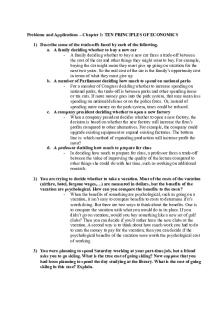Chapter 1 Economics and Economic Reasoning PDF

| Title | Chapter 1 Economics and Economic Reasoning |
|---|---|
| Author | Sandhya Singh |
| Course | Basic Economics |
| Institution | New York Institute of Technology |
| Pages | 2 |
| File Size | 99.4 KB |
| File Type | |
| Total Downloads | 58 |
| Total Views | 144 |
Summary
Notes taken for professor Bisrat's class. He doesn't share the powerpoint so these are the notes I was able to take....
Description
What is Economics? ● All economic questions and problems arise from scarcity ● Scarcity is the inability to satisfy all of our wants ● Wants are unlimited but resources (labor and capital) are limited ● Economics is the study of how people make choices under conditions of scarcity and of the results of those choices for society Marginal Costs and Marginal Benefits (Cost-Benefit Principle) ● Using economic reasoning, decisions are often made by comparing marginal costs and marginal benefits ● Marginal Cost is the additional cost over and above costs already incurred ● Marginal Benefit is the additional benefit above and beyond what has already accrued Understanding Sunk Cost ● Marginal cost does not include sunk costs-costs that have already been incurred and cannot be recovered ● People are often influenced by sunk costs ○ But sunk costs must be borne whether or not an action is taken, so they are irrelevant to the decision of whether to take the action ■ Sunk cost is not relevant for making economic decision ● Sunk Cost Fallacy: decision makers take previous costs into account when making decisions about the future ○ Examples: ○ “I might as well keep eating because I already bought the food” ○ “I might as well keep watching this terrible movie because I’ve watched an hour of it already” ○ “I might as well keep going to a bad/useless fitness class that I paid for” ● The Economic Decision Rule: ○ If the marginal benefits of doing something exceed the marginal costs, do it ■ MB > MC -> Do it! ○ If the marginal costs of doing something exceed the marginal benefits, don’t ■ MB < MC -> Don’t Opportunity Cost ● To obtain the benefit of something, you must give up something else-namely, the nextbest alternative ● Opportunity Cost is the benefit forgone of the next best alternative to the activity you have chosen ○ Should always be less than the benefit of what you have chosen ○ The basis of cost/benefit economic reasoning ● Opportunity cost of engaging in an activity is the value of everything you must sacrifice
to engage in it ● Examples of Opportunity Cost: ○ Individual decisions ○ Items you could have purchased with the money spent for tuition and books ○ Loss of the income from a full-time job ○ Money spent on a war is less spending on health care or education Microeconomics and Macroeconomics ● Economic theory is divided into 2 parts: ○ Microeconomics is the study of individual choice, and how that choice is influenced by economic forces ■ Studies things such as: pricing policy of firms and a household’s decision on what to buy ○ Macroeconomics is the study of the economy as a whole ■ Studies things such as: inflation, unemployment, and economic growth The Invisible Hand ● The Invisible Hand is the price mechanism, the rise and fall of prices that guides our actions in a market ○ An example of a market force ■ If there is a shortage, prices rise ■ If there is a surplus, prices fall ● The Invisible Hand Theory: A market economy, through the price mechanism, will allocate resources efficiently ○ Prices fall when the quantity supplied is greater than quantity demanded ○ Prices rise when the quantity demanded is greater than the quantity supplied ● Efficiency means achieving a goal as cheaply as possible Economic Policy Options ● Economic Policies are actions or inactions taken by the government to influence economic actions ○ Objective: policy analysis keeps value judgements separate from analysis ○ Subjective: policy analysis reflects the analyst’s view of how things should be ● To distinguish between objective and subjective analysis, economics is divided into two categories: ○ Positive economics: the study of what is ○ Normative economics: the study of what should be Functions ● A function is a relationship between the values of two or more variables...
Similar Free PDFs

Economics - Chapter 1
- 8 Pages

Solution Chapter 1 Economics
- 4 Pages

Chapter-3-Economic Analysis-1
- 39 Pages

Inductive and Deductive Reasoning
- 20 Pages
Popular Institutions
- Tinajero National High School - Annex
- Politeknik Caltex Riau
- Yokohama City University
- SGT University
- University of Al-Qadisiyah
- Divine Word College of Vigan
- Techniek College Rotterdam
- Universidade de Santiago
- Universiti Teknologi MARA Cawangan Johor Kampus Pasir Gudang
- Poltekkes Kemenkes Yogyakarta
- Baguio City National High School
- Colegio san marcos
- preparatoria uno
- Centro de Bachillerato Tecnológico Industrial y de Servicios No. 107
- Dalian Maritime University
- Quang Trung Secondary School
- Colegio Tecnológico en Informática
- Corporación Regional de Educación Superior
- Grupo CEDVA
- Dar Al Uloom University
- Centro de Estudios Preuniversitarios de la Universidad Nacional de Ingeniería
- 上智大学
- Aakash International School, Nuna Majara
- San Felipe Neri Catholic School
- Kang Chiao International School - New Taipei City
- Misamis Occidental National High School
- Institución Educativa Escuela Normal Juan Ladrilleros
- Kolehiyo ng Pantukan
- Batanes State College
- Instituto Continental
- Sekolah Menengah Kejuruan Kesehatan Kaltara (Tarakan)
- Colegio de La Inmaculada Concepcion - Cebu











